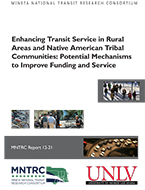Abstract:
rimary funding for rural transit comes from federal and state Departments of Transportation (DOTs). However, through numerous surveys, rural transit providers have cited financial constraints as a major limitation to providing adequate desired transit services, meaning that these traditional DOT funds are not sufficient for funding rural transit. Consequently, transit planners and providers must pursue additional funding beyond these traditional programs before they can meet and satisfy the transit demand.
To that end, the primary objective of this study was to identify and document current non-DOT (i.e., non-traditional) funding programs that rural transit providers and planners could pursue and acquire to close that funding gap and enable them to meet the transit demand.
Authors:
MOHAMED S. KASEKO, PH.D.
Dr. Mohamed Kaseko is an Associate Professor of Civil Engineering at the University of Nevada, Las Vegas (UNLV). He holds a Ph.D. degree from the University of California, Irvine and an MS degree from Cornell University. Dr. Kaseko’s major areas of research are in Traffic Operations and Safety, Transit and Multimodal Transportation, and Intelligent Transportation Systems. His other interests include Railway Transportation, Engineering Economics and Operations Research applications in Traffic and Transportation Operations. He has published several articles in technical journals and conference proceedings.
PERIS NYAGAH, MST
Peris Nyagah is a Ph. D student in Civil Engineering at the University of Nevada, Las Vegas (UNLV). Her research interests are in traffic engineering, transit planning, pedestrian planning and safety studies. She has a B.Sc. IT., from Jomo Kenyatta University of Agriculture and Technology, in Kenya, and a masters degree in Transportation from UNLV.
HUALIANG “HARRY” TENG, PH.D.
Dr. Hualiang “Harry” Teng is an Associate Professor of Civil Engineering at the University of Nevada, Las Vegas (UNLV). He received his Ph.D. from Purdue University, West Layette, Indiana, majoring in civil engineering. His research areas include ITS, air quality analysis, freight transportation, public transportation and railway transportation with a focus on high-speed rail. Dr. Teng has published several peer-reviewed papers in technical journals and conference proceedings. He has served on Transportation Research Board (TRB) committees on Highway Monitoring and Artificial Intelligence, and Advanced Computing.


